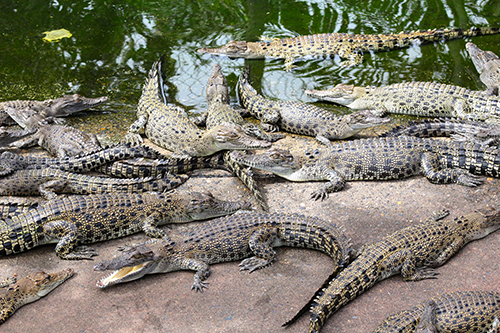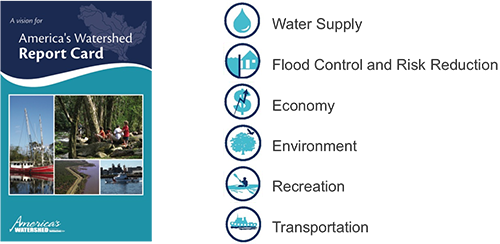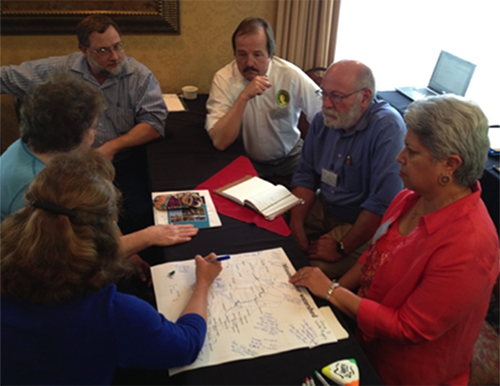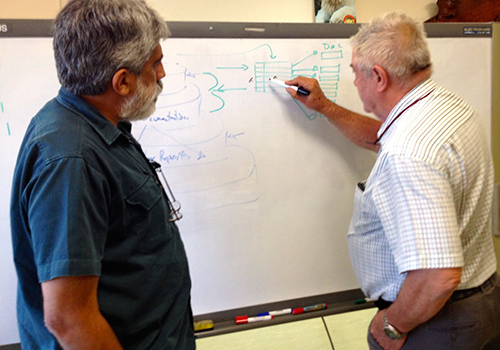Crocodile report cards
Heath Kelsey · | Environmental Report Cards | Learning Science |I had the unique opportunity to discuss report cards with a couple of global crocodile experts based in Darwin. Grahame Webb and Charlie Manolis are active in crocodile management and conservation globally, and operate Crocodylus Park in Darwin, a crocodile farm and research facility. Grahame is chair of the International Union for Conservation of Nature (IUCN) Crocodile Specialist Group, and Charlie is Chief Scientist at Crocodylus Park.
Grahame contacted me following a seminar on report cards I gave at CDU in March this year and we caught up a few days later. We discussed IAN’s current direction with report cards and assessment, and the need for multiple perspective engagement to achieve sustainable change. I was happy to discover some common interests, and was intrigued by the possibility of using the report card approach to assess the health of an iconic threatened species like crocodiles.

Grahame's views are a bit controversial; he insists that in order to achieve conservation goals for wild populations of crocodiles, people’s livelihoods must be included as equally important components of conservation planning and management. This includes crocodile farming for meat and hides, artisanal harvest of wild crocodiles, and even international trade in crocodile goods. This is abhorrent to many conservation-oriented individuals and organizations, who often view conservation of wildlife as the only objective. In Grahame's view, this single-issue advocacy is where we often fail in conservation efforts. Without considering the practical human social and economic considerations, conservation is doomed to failure.
Of great interest to me are the parallels in this way of thinking with the work we've recently done developing the Mississippi River report card. Kudos to The Nature Conservancy for understanding that in order to succeed in ecological restoration in the Mississippi River basin, social and economic interests need to be full and equal partners from the start, and that a shared vision developed together presents the best opportunity for achieving much needed change.

Using the report card process, we successfully engaged representatives from the transportation, water supply, recreation, environment, flood control, and economy sectors in developing a consensus built report card for tracking progress in all of these areas. By giving equal weight to economic, social, and environmental concerns, no single perspective is placed above or below another, fostering a collegial and collaborative atmosphere that might just have a chance at making a difference in a terribly challenging environment. Although the Mississippi River process is not complete, the feedback of participants in relation to developing this collegial and collaborative atmosphere has been overwhelmingly positive.

I met again with Grahame and Charlie last week to review a recent trip to Madagascar that Charlie had just taken where he introduced the report card concept. Currently in Madagascar, crocodile management is mostly non-existent, relying on inconsistent or incomplete measurements, and single issue advocacy. Farming interests try to expand while living with (not necessarily following) the Convention on International Trade in Endangered Species (CITES), and conservation NGOs push for restoration and conservation without a lot of enforcement capacity. In short, it's a big mess, and no one understands or even cares what others are doing. We discussed how the report card process, although difficult, might be useful in this context.
The objective for the report card in Madagascar is to jump start the management of a largely ungoverned industry. In Madagascar, the benefits include a chance to:
- Educate stakeholders on the perspectives of others,
- Create a shared vision for advancing crocodile population health
- Streamline reporting for CITES,
- Produce a tracking mechanism for sustainable crocodile wild populations and livelihoods.

The situation in Madagascar is exceedingly difficult as a result of the historically poor oversight of crocodile management and the lack of understanding on the part of different stakeholders. Charlie is continuing to advance the report card there, but we weren’t sure about our chances of success. A parallel effort in Cambodia may be more fruitful, and that’s next up for discussion.
It was a fascinating discussion that left me even more convinced that report cards are useful tools for advancing conservation and restoration goals for a broad range of difficult global issues.
About the author
Heath Kelsey

Heath Kelsey has been with IAN since 2009, as a Science Integrator, Program Manager, and as Director since 2019. His work focuses on helping communities become more engaged in socio-environmental decision making. He has over 15-years of experience in stakeholder engagement, environmental and public health assessment, indicator development, and science communication. He has led numerous ecosystem health and socio-environmental health report card projects globally, in Australia, India, the South Pacific, Africa, and throughout the US. Dr. Kelsey received his MSPH (2000) and PhD (2006) from The University of South Carolina Arnold School of Public Health. He is a graduate of St Mary’s College of Maryland (1988), and was a Peace Corps Volunteer in Papua New Guinea from 1995-1998.